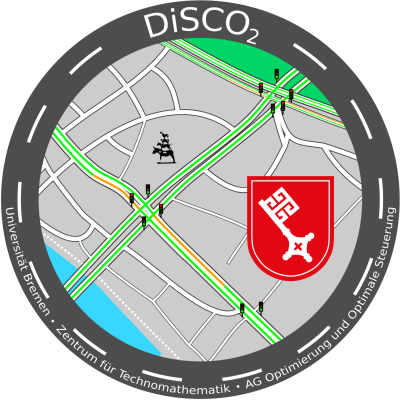DiSCO2-Bremen: Data-based and intelligent simulation of traffic for CO2 reduction in Bremen
| Working Group: | WG Optimization and Optimal Control |
| Leadership: | Prof. Dr. Christof Büskens ((0421) 218-63861, E-Mail: bueskens@math.uni-bremen.de ) |
| Processor: |
Dr.-Ing. Daniel Klosa
Dr. Amin Mallek ((0421) 218-63627, E-Mail: amallek@uni-bremen.de) Nicole Schröder ((0421) 218-59882, E-Mail: nic_sch) Felix Langen ((0421) 218-59896, E-Mail: felangen@uni-bremen.de) |
| Funding: |
AUF-Programm zur Förderung der angewandten Umweltforschung aus Mitteln des Europäischer Fonds für regionale Entwicklung (EFRE) und des Landes Bremen |
| Project partner: |
Verkehrsmanagementzentrale (VMZ) Die Senatorin für Klimaschutz, Umwelt, Mobilität, Stadtentwicklung und Wohnungsbau |
| Time period: | 01.07.2020 - 31.12.2022 |
 Man-made climate change has attracted increasing attention in recent years. Possibilities for reducing CO2 emissions are therefore of great interest. In Germany, car exhaust fumes are responsible for almost 20% of all CO2 emissions. Particularly in cities, CO2 emissions are high, since constant braking and acceleration on the one hand and low speeds below 50 km/h on the other hand drive up fuel consumption and thus CO2 emissions. Due to its geography, Bremen is strongly affected by this, since the surrounding rivers allow only a few connecting roads into the surrounding area, so that these roads have a high traffic density. The traffic management center in Bremen has the ability to control a large number of traffic lights and thus improve the traffic flow.
Man-made climate change has attracted increasing attention in recent years. Possibilities for reducing CO2 emissions are therefore of great interest. In Germany, car exhaust fumes are responsible for almost 20% of all CO2 emissions. Particularly in cities, CO2 emissions are high, since constant braking and acceleration on the one hand and low speeds below 50 km/h on the other hand drive up fuel consumption and thus CO2 emissions. Due to its geography, Bremen is strongly affected by this, since the surrounding rivers allow only a few connecting roads into the surrounding area, so that these roads have a high traffic density. The traffic management center in Bremen has the ability to control a large number of traffic lights and thus improve the traffic flow. In the DiSCO2 project, a so-called digital twin - a simulation of Bremen city traffic - is to be developed. This allows reliable predictions about the traffic flow and the associated CO2 emissions depending, for example, on the day of the week, the season, the weather situation and events. In addition, anomalies can be detected and the effects of road works and major events on the traffic flow can be captured and reduced.
For about 10 years, traffic density in the entire city area has been recorded with induction loop detectors at approx. 600 measurement locations. These recordings are suitable for the development of a data-based hybrid model, i.e. a model whose parameters are optimized using methods from the fields of Big Data and machine learning. Initially limited to one measuring point, the predictions will be extended to the entire urban traffic in the course of the project. Since the measurements can be used in real time, a further goal is the intelligent control of light signal systems to improve traffic flow and thus reduce CO2 emissions.


Publications
- A. Mallek, D. Klosa, C. Büskens.
Enhanced K-Nearest Neighbor Model For Multi-steps Traffic Flow Forecast in Urban Roads.
8th IEEE International Smart Cities Conference, 26.09-29.09.2022.
Paphos, Cyprus, IEEE Xplore, pp. 1-5, 2022. - A. Mallek, D. Klosa, C. Büskens.
Impact of Data Loss on Multi-Step Forecast of Traffic Flow in Urban Roads Using K-Nearest Neighbors.
Sustainability, 14(18), 11232, 2022. - D. Klosa, A. Mallek, C. Büskens.
Short-Term Traffic Flow Forecast Using Regression Analysis and Graph Convolutional Neural Networks.
2021 IEEE 23rd Int Conf on High Performance Computing & Communications; 7th Int Conf on Data Science & Systems; 19th Int Conf on Smart City; 7th Int Conf on Dependability in Sensor, Cloud & Big Data Systems & Application (HPCC/DSS/SmartCity/DependSys), 20.12-22.12.2021.
Haikou, Hainan, China, IEEE Xplore, pp. 1413-1418, 2021.

